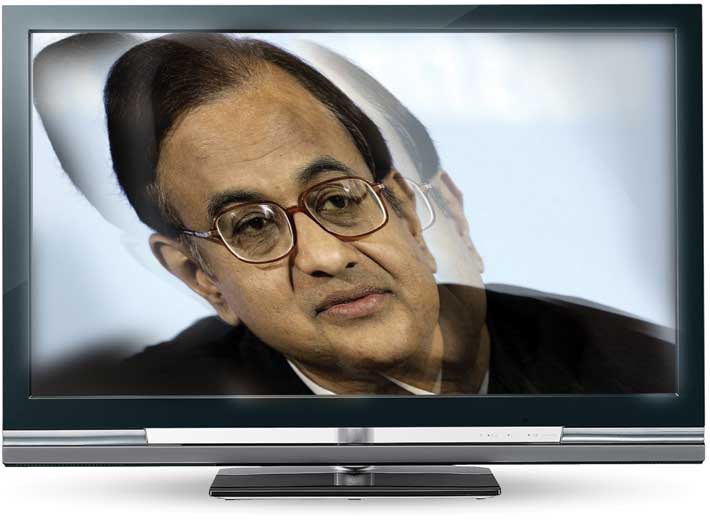A cabinet minister recently confessed privately that he was told by his European currency trader friend that the rupee might touch 99 to a dollar by the end of the year. This may be sheer exaggeration on the minister’s part, but it showed the concerns within the government about the sharply declining exchange rate. Several analysts, including a few foreign banks, have predicted that the rupee will soon breach the Rs 70 mark to the dollar in the next couple of weeks.
The sheer desperation about the rupee in a free fall – it has dropped over 20% in the past few months – was witnessed when the government took the unusual decision to ban the import of flat TVs under the duty-free baggage rules. Earlier, Indians, who travelled abroad, could return with a TV that was almost 25-50% cheaper than the same product sold in the country. Most experts were dumbfounded with the decision; they did not see how a measure like this could save the rupee.
However, the government logic was simple. About a million flat TV sets are purchased by Indians and brought into the country every year under the baggage rules. The duty-free imports generally arrive from Dubai, Singapore and Bangkok. Dubai officials contend that 2,50,000-3,00,000 TVs are annually purchased there. A back-of-the-envelope calculation shows that nearly 7,50,000 Indians checked into Dubai hotels last year and, therefore, a third of them bought a TV and brought it to India. The percentage may be less if we discount purchases by NRIs, who return home or visit India.
According to the Indian officials, this is a sheer waste of precious foreign exchange, since flat TVs are easily available in India. Like gold and silver, this is ‘conspicuous’ consumption and can be avoided. In the recent past, finance minister P Chidambaram has urged Indians not to buy gold. The reason: if we spend less foreign exchange, there will be less pressure on the current account deficit (CAD: the difference between what we spend in foreign exchange and what we earn).
CAD, incidentally, is the single-most important factor that has devalued the rupee. Economists maintain that CAD of a country like India should be around 3% of GDP. Since 1991, CAD has remained under this level and, in four years, it was even positive. But the situation has changed in the last two years. In 2011, CAD was a negative 4.2% of GDP and a negative 4.8% the next year; the estimate for 2012-13 is 5%. These are unacceptable levels, which have put pressure on the exchange rate.
Unfortunately, the government’s logic is a twisted one, and it can cause more harm to the economy than reverse the rupee fall. In fact, after the TV announcement, the rupee fell more aggressively against the dollar. Why is the government wrong? One, even if we take the average value of the imported TVs at $500 per piece, the government is likely to save foreign exchange worth $500 million every year. This is peanuts compared to the CAD of $90 billion, if we estimate the country’s GDP at $1.8 trillion.
The actual saving of foreign exchange will be much less than $500 million. This is because most of the airlines, especially those that started or transited through Dubai, allowed Indians to carry flat TVs of up to the 40-inch size without additional luggage charges. Thus, most Indians purchased these sizes, and a 40-inch TV in Dubai costs an average of Rs 20,000. If we estimate that almost 50% of the sets brought into India were in this price range, the move may reduce CAD by $400 million, or 0.44%.
Instead of any substantial impact on CAD, the move to ban duty-free imports of flat TV has sent the wrong signals to the investors and currency traders. The latter are convinced that the government has little idea of how to control the deficit and, hence, stabilise the rupee. This is exactly why currency traders, like the friend of the minister quoted above, are joking about a rate of Rs 99 to a dollar. Many feel that this government is ineffective and incompetent.
An impact of the ban on duty-free imports of TV will be a distorted market that may favour smuggling. Since the price differential between duty-free imports and domestic brands are 25-50%, it will provide an incentive to the smugglers, who can easily make a margin of 10-20% per set, even if one accounts for hawala premium and additional freight costs. The latter expense may not be significant as the means to illegally get other products into India are highly organized and can be used for TV sets too.
Niranjan Gidwani, the deputy CEO of the Dubai-based EROS Group, feels that the duty-free ban and, hence, the Indian government’s imposition of 36% import duty on flat TVs by default “is restrictive”. It may also “lead to opening up more corrupt channels at the India end, which might actually negate to some extent the purpose for which this exercise is being set up by the government of India.” The ban, according to him, may result in more outgo of money illegally from India.
Ironically, most experts think that the move was triggered more because of the demand by the foreign TV manufacturers that have production facilities in India. Leading TV companies had complained to the government that there was a huge grey market in flat TVs, especially in the premium segments. This cut into their market share, and impacted their revenues and profits. For almost a year or two, since the economic slowdown in India, they had urged for a ban on duty-free imports.
TV distributors explain that professional ‘carriers’, hired by unscrupulous traders, made regular trips to Bangkok, Singapore and Dubai, took advantage of the cheap air fares, and brought in flat TVs that were sold at a discount of 10-20% over the domestic prices. The cheapest tickets to Bangkok and Dubai cost Rs 9,000 and Rs 15,000, respectively, and profit margins of Rs 15,000-20,000 on high-end flat TV were enough for these traders to finance the carriers’ trips and still save money. However, the ratio of duty-free imports through such carriers may not have been more than 20-30% of the total annual imports, or 2,00,000-3,00,000 sets a year.
The only beneficiaries of the move may be the TV manufacturers, which felt the heat during the slowdown as duty-free imports comprised 12.5% of the total market (8 million flat sets) in the country. These companies can now raise volumes and, if the situation permits, also increase their prices in the near future.
The government must focus on other, and more critical, issues to reduce CAD and stabilize the rupee. Small-ticket measures like the ban on duty-free imports of flat TVs will not yield any substantial results. If the policy makers are serious, they need to look at imports of crude oil and fuel products, whose imports cost the country $188 billion in 2012-13. Even a 1% percent reduction in such imports can save $1.88 billion, which is substantially higher than the foreign exchange spent on TV imports.
The demand for diesel and petroleum can easily be reduced by greater hikes in their domestic prices. One can argue that this may dismay the middle and rich classes, and have an adverse electoral impact. But the same logic will apply to ban on duty-free TV, which is essentially a purchase item for middle-class Indians, who can afford to travel abroad. Fuel price hikes can lead to an overall inflation, but bans and hikes in customs duty on items like TV and gold will obviously distort the market, lead to smuggling and generation of black money. The latter may harm the economy more.

